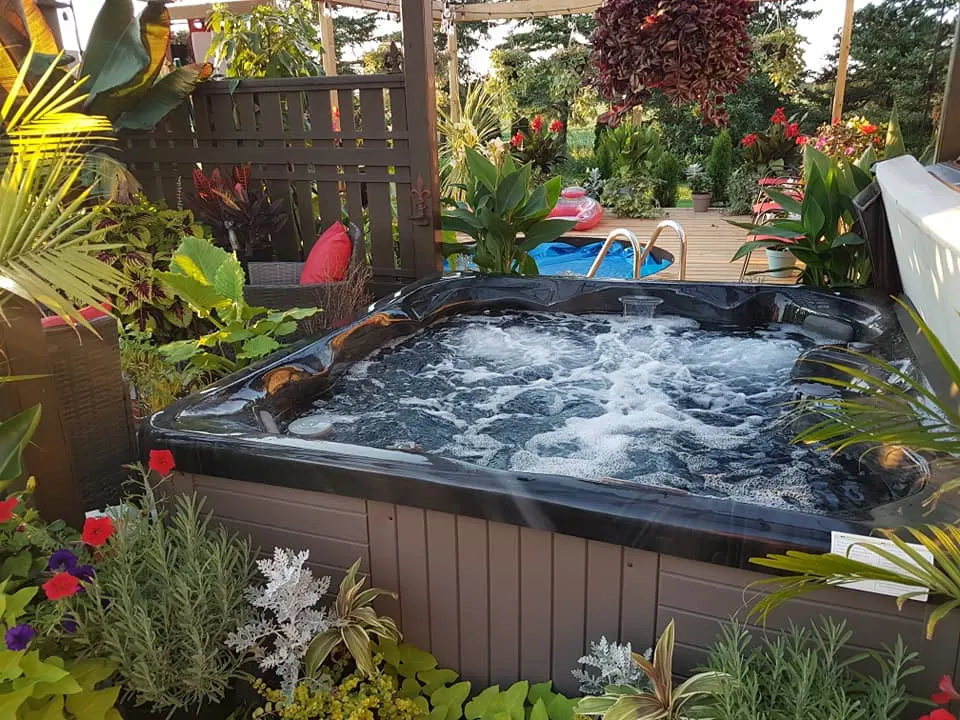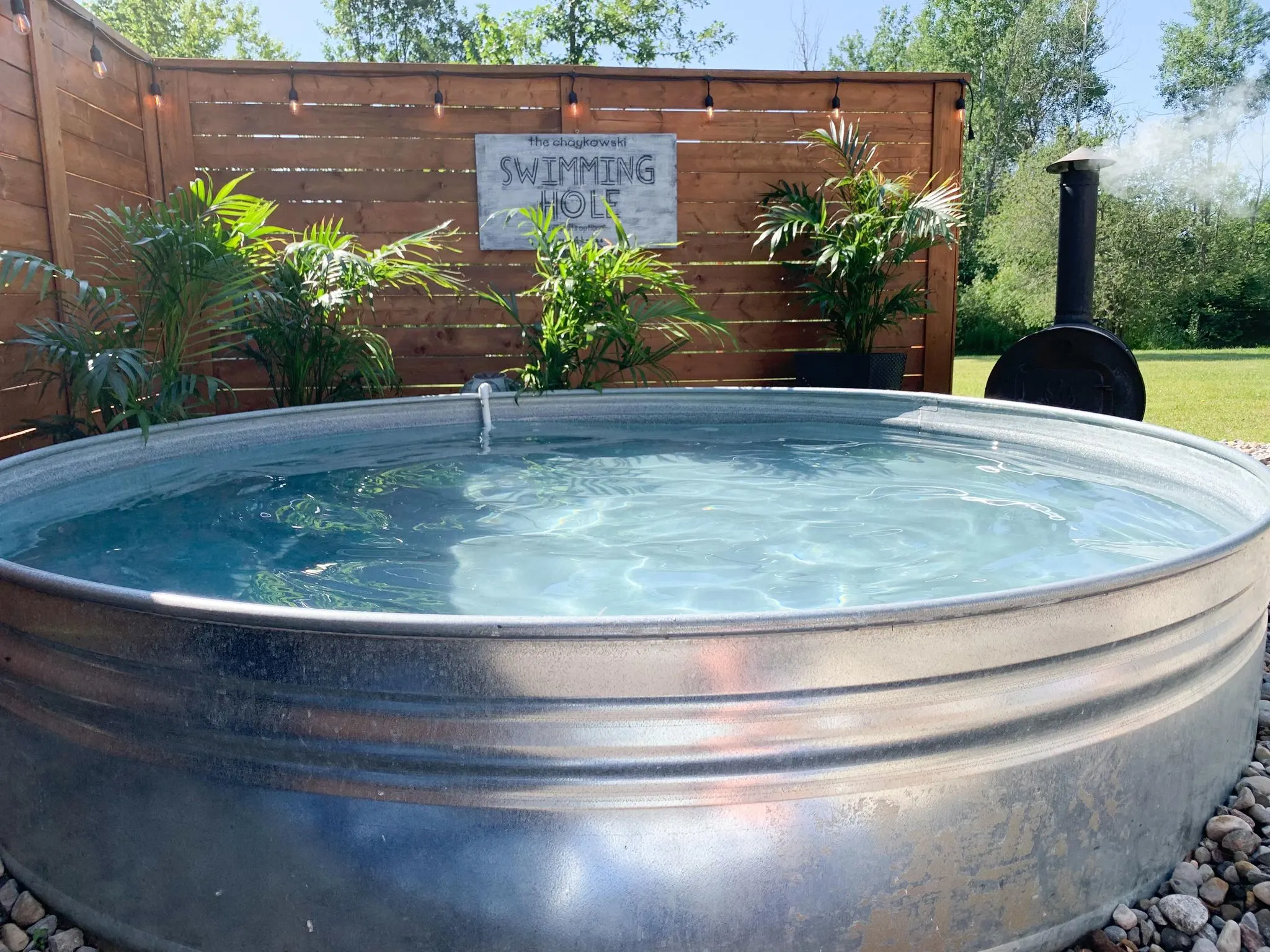Keeping stock tank pools safe should be one of the top priorities for owners to protect their families. Considering the size of a stock tank, however, one might assume that stock tank pools are an automatic fool-proof and safe alternative to in-ground pools.
The fact that swimming pools can be difficult to maintain and, when untreated, can lead to recreational water illnesses, such as e: Coli, hepatitis A, and salmonella. As a result, pool maintenance plays a significant role in ensuring everyone’s safety.
Keeping in-ground pools clean can be very expensive, with a monthly cleaning routine costing an average of $229. It is at this point that stock tank pools prove to be beneficial.
To answer the question, “are stock tank pools safe?” we have compiled a list of the most commonly asked questions, as well as tips to keep them clean.

Source: Sheilah Dixon Huckabee (Georgia)
Page Contents
Are Stock Tank Pools Safe?
There are many factors to consider when considering whether or not to invest in a stock tank pool if safety is your main concern. It can be anything from having a dirty stock tank pool to mosquito breeding problems, as well as the safety of young kids.
We will be covering all the things to keep in mind when deciding if stock tank pools are the best option for you.
Is it Hard to Keep Stock Tank Pools Clean?
In general, pools require regular cleaning and maintenance. Nonetheless, stock tanks offer the advantage of being simpler and less expensive to maintain than other pool alternatives. Maintenance is easy because it’s portable and durable.
Keeping stock tank pools safe also means keeping them clean, so ensure you have the necessary pool cleaning supplies. This includes a floating chlorine dispenser, chlorine tablets, a reliable pool skimmer, and a filter pump.
Annoyed by the slippery “slime” build-up on the sides or bottom of your stock tank pool? This can happen to any pool.
In this case, the slime is algae, which can grow and, unfortunately, contribute to the growth of bacteria. Having said that, you do not need to worry too much about this as it can be handled with regular pool maintenance and basic pool cleaning.
For a more in-depth look, check out this comprehensive stock tank pool maintenance guide.

Source: Sheilah Dixon Huckabee (Georgia)
How About the Dangers of Mosquitos?
Because stock tanks are smaller in size, they may be more prone to standing water if not used on a regular basis. In many parts of the country, standing water attracts mosquitoes to lay eggs and contributes to the spread of mosquito-borne diseases.
Although this may be a concern, it can be easily resolved with a simple yet effective solution: mosquito netting! During the night, place mosquito netting over your stock tank pool, and when ready, remove the netting and jump right in.
For added safety, it’s a good idea to keep the pool water clean and safe by cleaning it routinely and refilling it from time to time as well.
Can Stock Tank Pools Get Too Hot?
Considering that stock tanks are giant metal buckets, you may think that using one as an above-ground pool on a hot day could overheat the water.
This could pose a danger to swimmers, especially children who may jump in and soak without much thought.
Fortunately, although stock water tank pools may become mildly uncomfortably hot, particularly in an open area without shade or a cover, keeping the stock tanks filled with water allows them to remain reasonably usable even on hot days.
Plus, the pool water gets cool again overnight.
An instant solution to this is placing an umbrella over your stock tank pool or, if you are considering getting one, placing it under a tree shade.
Additionally, you may want to keep the water pump running to maintain a steady temperature and keep the water moving.

Source: Carilyn Jacqueline (Southern Ontario, Canada)
Do Stock Tank Pools Rust?
Although stock tank pools may also be constructed from plastic, most owners get a galvanized stock tank that is more durable and will last for many years if properly maintained. That being said, metal stock tanks do rust.
When left untreated or unpainted, galvanized metal won’t last for a long time since pool chemicals or salt will eventually rust the metal or eat away at the paint.
To prevent rusting, we suggest applying spray-on truck bed coatings or rubber coatings to the inside of the stock tank.
Because pool chemicals, such as chlorine, contribute greatly to rusting, be sure to place chlorine tablets in chlorine floaters so they do not come into direct contact with the metal tank.
Is There a Risk of Drowning?
Often overlooked, stock tank pools are usually only two feet in depth. Despite that, drowning is a risk in any pool, whether big or deep.
Your stock tank pool should be kept out of reach of children and toddlers who, when left alone, may suddenly decide to jump into it.
Alarmingly, the Centers for Disease Control and Prevention (CDC) reports that drowning is the leading cause of unintentional death among children ages one to four.
So, just a word of caution, children should never be left unattended in a stock tank pool or any other pool.

Source: Lisa Chaykowski (Ottawa, Ontario)
Final Thoughts
Keeping stock tank pools safe is the same as keeping other pools safe. Make sure that it is properly maintained and kept clean and that children are supervised at all times when they are swimming.
With the entire family fitting into a stunning two-story barndominium, keeping stock tank pools safe can help everyone enjoy a great swim day without worrying.
Noah Edis is a passionate staff writer at Barndominium Life, a leading online resource for all things barndominium. With years of experience in the writing industry, Noah has made a name for himself as a skilled storyteller and a knowledgeable authority on the topic of barndominiums.
Noah’s interest in barndominiums began when he stumbled upon the concept while researching alternative housing options. Intrigued by the rustic charm and functionality of these converted barns, he soon became obsessed with the idea of living in one himself. He spent countless hours researching the construction, design, and decorating aspects of barndominiums, and soon became an expert on the topic.
As a staff writer at Barndominium Life, Noah enjoys sharing his knowledge and passion for these unique homes with others. He has written numerous articles covering a wide range of topics, from the history of barndominiums to the best ways to decorate them. Noah’s writing is informative, engaging, and always on-trend, making him a valuable asset to the Barndominium Life team.
Noah is a graduate of the University of British Columbia, where he earned a degree in English Language and Literature. When he’s not writing about barndominiums, he can be found exploring the great outdoors, trying new restaurants, or spending time with his family and friends. Noah is dedicated to his craft and is always striving to improve his writing skills and knowledge of the barndominium lifestyle.
Connect with Noah on LinkedIn
